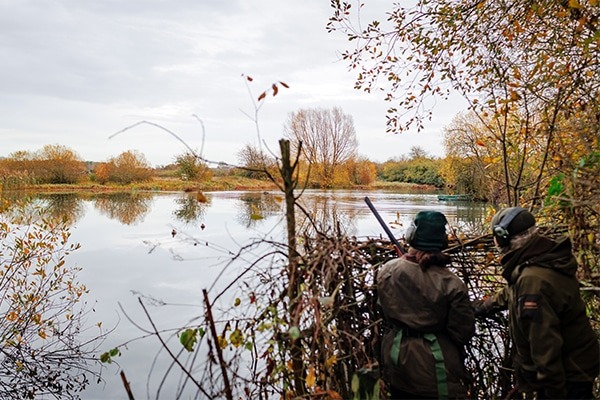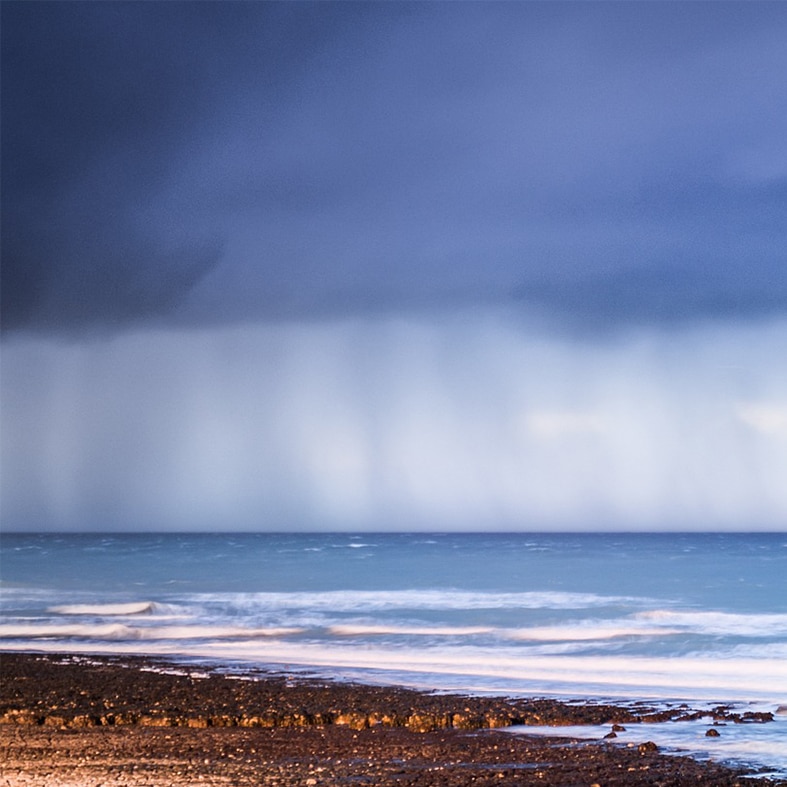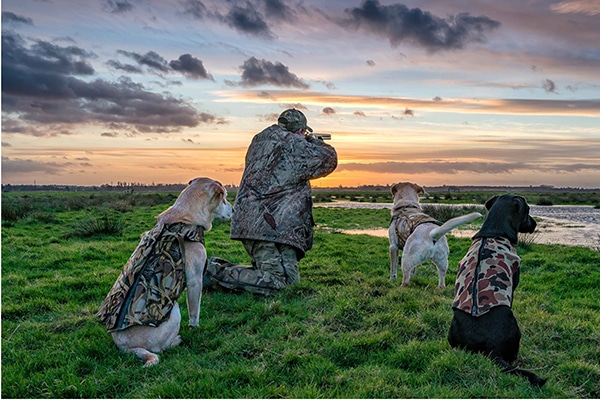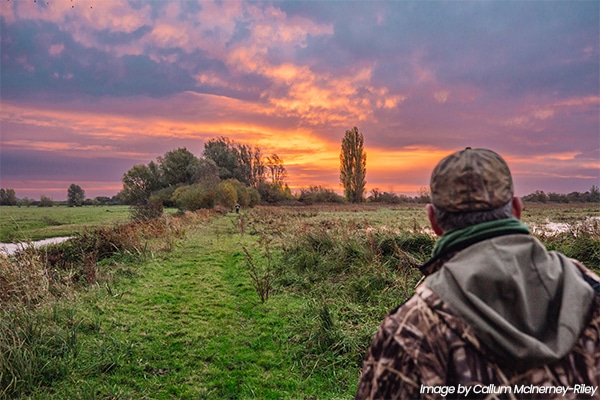
Wildfowling advice
Find out everything you need to know about wildfowling. Whether you are new to it, or want more practical advice we’ve got you covered.
Get information on the legal shooting season for mammals and birds in the UK.
Apply for funding for your project or make a donation today
Comprehensive information and advice from our specialist firearms team.
Everything you need to know about shotgun, rifle and airgun ammunition.
Find our up-to-date information, advice and links to government resources.
Everything you need to know on firearms law and licensing.
All the latest news and advice on general licences and how they affect you.


Home » Wildfowling » Wildfowling advice » Severe weather and waterfowl shooting
In periods of prolonged severe weather (typically persistent freezing conditions) the relevant government ministers have the power to make protection orders suspending the shooting of wildfowl and waders in England, Wales and Scotland, under Section 2 (6) of the Wildlife and Countryside Act, 1981. Similar provisions apply in Northern Ireland under the Wildlife (Northern Ireland) Order 1985 (as amended 2011).
The shooting of wildfowl and waders is normally suspended after 14 consecutive days of freezing weather. The criteria for triggering the severe weather procedures are based on the air and grass temperatures collected daily by 25 coastal weather stations around Britain. The procedure leading up to a suspension of waterfowl shooting is as follows:
When more than half of the meteorological stations (in Scotland and/or England/Wales) have recorded frozen conditions (determined from minimum air and grass temperatures) for seven consecutive days (but allowing short periods of thaw), the country nature conservation agencies (NE, NRW, SNH) liaise with us and we normally advise a period of voluntary restraint of shooting whilst severe weather conditions last.
The information from each weather station is gathered each morning and reflects the lowest air and grass temperature recorded that night.
This combination of minimum temperatures has been found the most appropriate to reflect difficult feeding conditions for feeding waterfowl. Also important is that the information is available by 12 noon each day to aid decision-making.
At this point we may well call for voluntary restraint in waterfowl shooting wherever conditions require it.
If the severe weather looks set to continue BASC informs its members generally but particularly the secretaries of its wildfowling and game shooting clubs, joint councils, syndicates and gamekeepers that, if the weather conditions continue for a further 6 days, then a protection order suspending the shooting of wildfowl and waders in the appropriate country is likely to be signed on the 13th day, to take effect at 00.01am on the 15th day.
The arrangements for waterfowl shooting during prolonged severe weather in Northern Ireland are broadly similar. For detailed information contact BASC Northern Ireland.
Restraint should be a part of normal waterfowl shooting but prior to the above procedures being brought into action BASC will call for voluntary restraint, where it is needed, from day seven of severe weather, up to the time when any statutory suspension is imposed.
Such restraint is an integral part of the arrangements for waterfowl shooting during periods of prolonged severe weather. There are guidelines available from BASC, but there are no set rules as conditions and requirements vary around the country. Wildfowlers and game shooters are best placed to consider all the facts relevant to their particular locality and to decide the most appropriate action.
It is voluntary restraint that is urged by BASC, not a suspension, although if necessary, a self imposed suspension may be the best course of action.
In recent years organisations such as RSPB, Wildfowl and Wetlands Trust, British Trust for Ornithology, and statutory conservation agencies, have supported our calls for voluntary restraint in waterfowl shooting during prolonged severe weather, by calling on their own memberships and the wider public to minimise disturbance to birds in wetland areas.
This is a welcome development as waterfowl at such times benefit from reduced disturbance from all recreational users of their habitats.
NB The amount of snow cover is not measured in the formal weather monitoring process. In Scotland this is taken into account in its decision-making, not least in light of the need for inland feeding for geese.
Elsewhere in Britain it is at the voluntary restraint stage that such covering of feeding grounds should also be considered when decisions about shooting are taken at the local level.
The criteria for deciding when there should be a suspension of waterfowl shooting have been decided jointly by the Department of the Environment Food and Rural Affairs, Joint Nature Conservation Committee, BASC, RSPB, WWT, BTO, Game and Wildlife Conservation Trust and others.
The criteria have been adopted by the Scottish and Welsh governments for use as appropriate in their countries. These bodies are closely involved in any implementation of the procedures, and BASC, in particular, as representing shooting, is formally consulted before a protection order is signed.
This depends on the extent of the severe weather. A suspension can be imposed throughout Great Britain, in Scotland alone or in England and Wales. Northern Ireland has its own, similar, arrangements. If you are in any doubt, contact your country or regional BASC centre.
Short periods of thaw (i.e. only one or two days) are neutral in that they neither count towards nor terminate the severe weather process. A thaw of three days (when half or fewer of the weather stations have recorded freezing conditions) resets the counter to zero on the third day of thaw.
Even if the weather changes for the better by day 13 a statutory suspension is still likely to follow (to allow birds to recover any lost condition or return to their normal habitats), although it may not last so long (see below).
When a protection order is signed, BASC will inform its members and the shooting community via its website, emails to membership groups, telephone messages, and press releases to national/regional newspapers and media, and the sporting press. The appropriate government department and conservation agencies will also undertake to issue notices to the public through the press and media. The non-governmental bodies, including RSPB and WWT, contribute to the publicity campaign through their own press and other means calling on their members also to minimise disturbance of wetlands.
This website is kept fully up to date through all periods of prolonged severe weather. You can also contact your BASC country or regional centre where a 24-hour telephone information service will be available:
Local wildfowling clubs and game shooting syndicates will inform their members of details of any voluntary restraint prior to a statutory suspension.
When a protection order is signed, it becomes an offence to kill or take any of the following species, whether on the coast or inland:
Gamebirds are not affected, but reared duck are included.
NB: Shooting of geese for crop protection, protecting human health and safety etc. during any statutory suspension is also prohibited unless otherwise permitted by an appropriate general licence or individual licence issued by a statutory agency (such as Natural England). Any such shooting should be conducted to minimise unnecessary disturbance to other waterfowl.
A statutory suspension of waterfowl shooting is imposed for 14 days although it is normally reviewed after seven days.
The suspension may be lifted before the end of 14 days if weather conditions improve, although this will take into account the need for a recovery period for waterfowl body condition and feeding opportunities after the severe weather. Any such early lifting is agreed by all the appropriate organisations.
If the suspension is lifted early, BASC and the appropriate government departments use available means to inform waterfowl shooters, and other wetland users, of the fact.
If the severe weather continues beyond the first 14 days, and looks likely to continue, a second protection order may be signed, suspending waterfowl shooting for up to a further 14 days.
A second statutory suspension will also be reviewed after seven days but, by then birds will have experienced difficult conditions for some five weeks, and so extra time might be needed for their recovery.
In addition to acting responsibly ourselves during prolonged severe weather we all can help waterfowl under pressure from the conditions, by informing all shooters, especially during statutory suspensions, of the situation and encouraging other users of wetlands to avoid unnecessary disturbance of the birds until conditions improve.
On JNCC’s website you should find a form on which you can record observations of waterfowl body condition and habitat conditions.
From day seven onwards, waterfowl shooters around Great Britain can help key organisations decide on the most appropriate actions during prolonged severe weather by completing and sending in these monitoring forms.
Clubs and shoots should consider, ahead of the shooting season, how they will inform their members and non-club permit holders, of any decision. This will be particularly important for those travelling considerable distances for their shooting.
Potential means of communication include telephone, social media, emails, text messages, local newspapers and radio stations, as well as notices posted at access points to the marsh.
Club committees and shoots should also consider what liaison with other wildfowling clubs or shoots would be appropriate at these times, together with the degree of any coordinated action with neighbouring groups which might be appropriate. Again, agreement over consultation procedures at an early stage would help ensure that any lines of communication work smoothly when they are required.
Clubs and shoots may find the following points helpful in enabling them to decide what action is appropriate during a period of voluntary restraint. Such actions may be as a response to only small changes in bird behaviour, which may require only some reduction of disturbance to birds during that period, up to conditions of very difficult feeding which might require a total (voluntary) suspension of shooting in the locality. Problems which may arise from possible large numbers of wildfowlers using the marshes and practical difficulties in wardening may also need to be considered in some localities.
The appearance of unusual species and influxes of unusual numbers of waterfowl often suggest conditions hardening over a wide area. Tameness and other abnormal behaviour often follow, perhaps presenting opportunities for excessive bags. Appropriate responses might be to introduce bag limits or reduce those which already exist.
Increasing evidence of birds under stress, particularly coupled with high winds (the wind chill factor being a key element in how much energy birds expend in order to keep warm) might lead to time limits on shooting, so as to help birds conserve energy and have periods of undisturbed feeding.
Any signs of loss of body condition, freezing foreshores, ponds and lakes, and/or total snow cover on saltmarsh or inland feeding grounds might be thought enough to warrant a local suspension of shooting until such time as the birds have recovered.
It should be borne in mind that after particularly hard and/or prolonged severe weather it might be appropriate for clubs and shoots to phase in normal shooting levels, even after a statutory suspension has formally ended, if local conditions still warrant it.
It may also be appropriate to take action if your shooting, though unaffected itself by local severe conditions, is adjacent to an area more badly affected, such that birds are taking refuge on your land while the difficult conditions persist.
Throughout any period of voluntary restraint and subsequent statutory suspensions wildfowling clubs and game shoots have the opportunity to demonstrate through the local media their responsible attitude to management of their shooting.
Finally, clubs and shoots are asked to maintain close liaison with their BASC Country or Regional Centre over any actions which they take. It is most important that your Association is fully abreast of the situation around the country when consulting with government and other parties involved in the severe weather arrangements.
It is in the shooting community’s interest to be seen to respond responsibly during prolonged severe weather, even though wildfowl and waders may not always show signs of suffering from the conditions. We have gained much respect by our actions in the past and must not jeopardise this by thoughtless or irresponsible behaviour.

Find out everything you need to know about wildfowling. Whether you are new to it, or want more practical advice we’ve got you covered.

The aim of this code of practice is to give clear guidelines as to what is acceptable conduct, both for the newcomer to the sport and experienced wildfowlers.

To be successful when it comes to wildfowling a certain level of skill and knowledge is essential, including understanding the habitat.